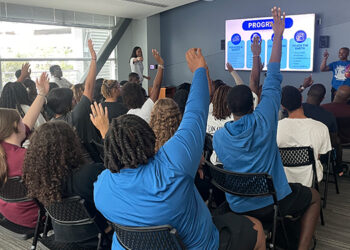
Across the nation, tens of thousands have applied for unemployment in the last week.
COVID-19 has had unprecedented effects on the economy and workforce of America. Campus recreation, however, is doing what it can in terms of staffing to keep not only full-time staff employees, but part-time/student staff as well.
What are Universities Doing with Student/Part-time Staff?
The University of Maryland, Baltimore (UMB) University Recreation and Fitness (URecFit) took a proactive and humanitarian approach in terms of employment. In early March, the U.S. Department of Education sent a directive that allowed universities to make Federal Work Study (FWS) payments to disaster-affected students who are unable to continue working. Joining forces with the Division of Student Affairs, the departments made this also happen for non-FWS student employees as well.
Bill Crockett, the acting assistant vice president of Student Affairs, shared how they are taking care of student employees during this pandemic:
- Students can telework and report those hours. It is up to the supervisors to define what this is, how it works, what is assigned and how it is managed.
- Each student employee’s average pay was calculated for the semester based on previous pay periods worked. All students not assigned to teleworking are being paid that amount from March 15 through the pay period ending on May 23, 2020. This is 10 weeks of paid time.
- Students can do some teleworking, and if it is less than their average pay, they will still receive their average pay.
However, Crockett noted both URecFit, led by director Julia Wightman, and Student Affairs are intentionally limiting how much they are asking of student employees to telework. “We want them to focus on their academics and managing their new way of learning via distance education,” he said. “Very few are tapped into some form of telework. Instead, professional staff perform regular check-ins to support them, see how they are doing and keep them engaged. When appropriate and the opportunities arises, some leadership development and in-service does occur remotely.”
At the University of Connecticut (UConn), they have focused on taking care of student employees as well. UConn Recreation director Jay Frain said they have made a commitment to pay all scheduled student staff through April 5.
He said while it’s logistically impossible to remotely manage the entirety of the 400 student employees, they do have various objectives in place. “One example is continuing classes in our fitness instructor development program, which will allow us to move back into operation successfully when the crisis has been contained,” said Frain.
Over at Florida State University, the challenge is creating connection points for students via virtual channels. “Our programs and facilities are typically student run, with professional coaching and mentoring, and we are doing our best to maintain that mission even during these challenging times, through paid student employment through remote locations, where possible,” said Chris Morris, the director of Campus Recreation. “The real opportunity is to more fully embrace the chance to engage students who might not typically come through our doors, for whatever reason.”
Eli Barrett, the assistant director of facilities and membership services at Colgate University, said they have canceled part-time staff shifts and asked them to stay home. The university has committed to paying them until the end of June and alternative work plans are in development.
Some ideas that are being discussed include utilizing and shifting staff to different departments that are still open, developing virtual learning programs for students like a virtual physical education class, and have part-time staff pursue professional continuing education — i.e. journals, videos, etc.
What are Universities Doing with Full-time Staff?
In terms of full-time staff, Barrett said the university has committed to pay them until the end of June as well.
He explained they have various projects to work on from home. “A lot of these projects include website management, rethinking and redrafting policies and procedures, and developing student and staff enrichment programs for the future, etc.,” shared Barrett.
Frain explained UConn Recreation’s leadership team quickly rerouted to a virtual strategy in order to have all professional staff continue to work full-time during the stay-at-home period. “We have refocused our work on what was to be our Q2/Q3 summer initiatives specific to technology projects, human resources, facility maintenance and equipment purchases,” he said.
At UMB, professional staff are teleworking. “We had time to plan and place the resources necessary for success,” said Crockett. “Knowing our facility closure had an uncertain return time, resources were inventoried and provided to staff so that remote working would not be a technological, hardware based, or infrastructure challenge. After only a week, I’m proud to say the adjustment is going well. People are checking in and not checking out. Ideas and new ways of thinking are emerging daily.”
Further Advice on COVID-19 Employment
Crockett did share that Student Affairs advised staff to stay closely connected. With all the concerns, questions and fears, the department reiterated everyone’s first focus is supporting and serving students by being flexible and adaptable.
“Be willing to think differently, be gracious, show gratitude, continue to stay connected, and when the situation allows for the safe return to campus, find ways to celebrate your team coming back together,” he emphasized.
Barrett noted a large part of success in having a remote workforce is keeping staff informed. By doing so, panic about lost hours or an uncertain future is decreased. He has been sending out information from the university and national level, helping staff understand it.
One key he noted during this time is to trust the process and share when the time is right. Don’t get in the way of those trying to make decisions. “Practice patience and trust the experts will do what is right for your staff, students and community,” said Barrett. “When the time is right or when it is asked, share resources, experience or knowledge in a clear and concise way. We want to be able to add helpful information to decisions, not overwhelm the experts who are making them.”
Finally, Crockett said if you haven’t yet had the conversation with your leadership on paying student employees, do so now. Advocating for them is essential, especially in this crisis. At UMB, URecFit is the largest student employer on campus. With many students relying on that income, and with many facing uncertainty at this time, Crockett explained they wanted to take one less stressor out of the equation.
“Our student employees are part of our university family who have shown dedication, engagement, leadership, and stewardship of our programs and facilities,” he said. “I am very proud of the way UMB has led through this. We placed the financial impact aside to do what was right. We know whether it’s coming from our cash reserves or other financial strategies, it was important to act now and resolve those details later. Looking after your people when things are dire isn’t easy, especially in such an unprecedented situation being faced today. If and when things improve, I hope our gesture ensured our student employees had the security necessary for success.”










